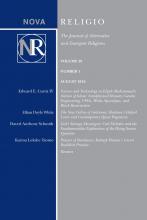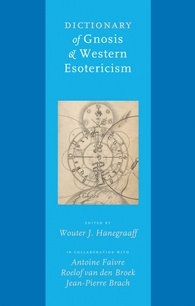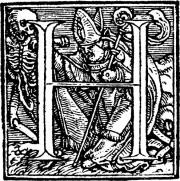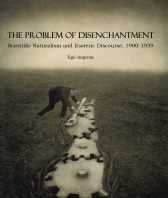For some time now, a debate has been rolling about the status of “pagan studies” as a field of academic research. It’s not that there’s been any doubt about the importance of studying contemporary paganisms; on the contrary, academic as well as mainstream interest in reconstructionist pagan groups as well as magical groups along the lines of Wicca and Thelema, still appears (anecdotally) on the increase. The problem has rather been with the aims and goals of pagan studies as a prospective discipline, as well as the approaches advocated for studying it. In an article just published in The Pomegranate – the foremost (or, rather, the only) peer-reviewed academic journal dedicated to this field – the up-and-coming (and highly productive) scholar, Ethan Doyle White (known from the Albion Calling blog), argues that the time has come for reform.
New review of The Problem of Disenchantment (Nova Religio)
 I was pleased to see this new review of The Problem of Disenchantment in the latest issue of Nova Religio. Christopher Plaisance generously concludes that
I was pleased to see this new review of The Problem of Disenchantment in the latest issue of Nova Religio. Christopher Plaisance generously concludes that
Replacing the Dictionary: Brill launches new Esotericism Reference Library
It has been more than a decade since the Dictionary of Gnosis and Western Esotericism (2005) was released, the flagship volume of what was then a fledgling field with few reliable introductions and reference works. At the time this was a milestone achievement, pulled off by a dedicated editorial team, 147 authors, and taking the better half of a decade to complete.
That is not to say that the result was perfect. Although the Dictionary was selected a Choice Outstanding Academic Title in 2006, a number of criticisms of selection policy, range, and terminology were put forward and discussed in the academic community from the beginning.
New podcast interview on esotericism, CSR, and interdisciplinarity (in Norwegian)
Some months back, when I was still in California, Knut Melvær interviewed me for the Norwegian podcast Udannet. The episode is up now. In the unlikely case you have any interest in hearing me stutter on in Norwegian for an hour about my research, the academic study of esotericism, the difficulties of interdisciplinary work, CSR, and related trivia, go check it out. (Bonus feature: bizarre nervous giggling at the 9’50 mark, in response to the question: “But what do esotericism scholars really find out?” – I did have an answer in the end though, phew).
The scholastic imagination

The human sensory and cognitive system, according to the German scholar Johan Lindner of Mönchenburg. Illustration to a manuscript copy of Aristotle’s De Anima (1472-1474), courtesy of the Wellcome Collection (MS 55).
I’ve recently been reading up on medieval theories of cognition. The background is a paper I’m writing on esotericism and “kataphatic practices” – contemplative techniques where the practitioner uses mental imagery, sensory stimuli, and emotions to try and achieve some religious goal: Prayer, piety, divine knowledge, salvation, etc. Kataphatic practices may be distinguished from “apophatic” ones, which, although they may be pursuing the same goals, use very different techniques to achieve them: withdrawing from sensory input and attempting to empty the mind of any content, whether affective, linguistic, or imagery-related (note that the kataphatic-apophatic distinction is more commonly used as synonymous with positive vs. negative theology – that’s a related but separate issue to the one I talk about here). My argument is that esoteric practices are typically oriented toward kataphatic rather than apophatic techniques. The cultivation of mental imagery is usually key – which means that the notion of “imagination” needs to be investigated more thoroughly.
Review symposium on “The Problem of Disenchantment”
The Journal of Religion in Europe has just published a review symposium on my book, The Problem of Disenchantment (2014). I’m excited to say that it contains critical reflections from three world-class scholars of religion, along with my own response. Hans Kippenberg, a well-known expert on Weberian approaches to the history of religion, evaluates some of the book’s claims in light of a broader reading of Weber’s oeuvre. Willem Drees, one of the leading figures in the “religion and science” field, takes a closer look at some of the points I made about the new natural theologies that emerged in the early twentieth century – specifically their relation to esotericism and “heterodoxy”. Finally, Ann Taves, a leading American scholar of religion working with (among other things) the cognitive science of religion and the notion of experience, continues a discussion that she and I have been having over the past few years regarding the perception, explanation and interpretation of “events” (for more on this, check out our forthcomming co-authored target article in Religion, Brain, & Behavior) . If you’ve got access, go ahead and read them!
While you are at it, you may also be interested in checking out my response, which I called “The Disenchantment of Problems: Musings on a Cognitive Turn in Intellectual History” (non-final version uploaded here, and added to my Academia page for easy access).
Why fear the history of science? A brief response to Don Wiebe
 I am more used to being labelled a “scientistic reductionist” than an “anti-science relativist”. While neither is particularly accurate, I was certainly surprised to see Don Wiebe review my book, The Problem of Disenchantment, as a “full-scale attack on modern Western science” (p. 1). Ironically, the review (published online in the journal Religion) appears side by side with an article of mine [free postprint here] that argues for consilience between the humanities and the sciences, so readers are likely to walk away a bit puzzled.
I am more used to being labelled a “scientistic reductionist” than an “anti-science relativist”. While neither is particularly accurate, I was certainly surprised to see Don Wiebe review my book, The Problem of Disenchantment, as a “full-scale attack on modern Western science” (p. 1). Ironically, the review (published online in the journal Religion) appears side by side with an article of mine [free postprint here] that argues for consilience between the humanities and the sciences, so readers are likely to walk away a bit puzzled.
Since the charge of anti-science is a serious one, however, and since it comes from a well-respected scholar whose ardent support for a scientific and secular study of religion I have, in fact, admired since my undergraduate days, it seems necessary to take a moment to clarify some crucial issues that appear to get mixed up in the review.
New blog at Occult Minds
When I launched the website of my current postdoctoral research project (“Occult Minds: Esotericism as Cognition and Culture”) last August, it was with the intention of keeping a research blog that would be updated fairly regularly. Not much has happened on the blog front the past six months (let’s just say that I needed to prioritize my writing tasks), but now I have updated it with a post that looks at some precursors for the aim of the project: which is to bring together the study of esotericism and the cognitive science of religion. Spoiler: There really isn’t much to find – but esotericism scholars can learn from some of their colleagues studying Gnosticism.
I hope to update the Occult Minds blog more frequently in the coming months, so stay tuned for further updates.
Esotericism in Antiquity: An Aries special issue
 There is much exciting work going on in the area of esotericism and the religions of antiquity at the moment. One of the people who have been instrumental in lifting the focus on antiquity within the study of esotericism (and bringing esotericism to a sometimes unwilling crowd of Gnosticism and ancient Christianities specialists – kudos for that!) is Dylan Burns, currently of the University of Leipzig. I’ve written about Dylan’s work previously, and of course, there’s been mention of the ESSWE Network for the Study of Esotericism in Antiquity (NSEA) which he co-founded with Sarah Veale.
There is much exciting work going on in the area of esotericism and the religions of antiquity at the moment. One of the people who have been instrumental in lifting the focus on antiquity within the study of esotericism (and bringing esotericism to a sometimes unwilling crowd of Gnosticism and ancient Christianities specialists – kudos for that!) is Dylan Burns, currently of the University of Leipzig. I’ve written about Dylan’s work previously, and of course, there’s been mention of the ESSWE Network for the Study of Esotericism in Antiquity (NSEA) which he co-founded with Sarah Veale.
Now, fresh off those unobtanium-coated Brill printers (more…)
Launching “Occult Minds”: official website of my postdoctoral research project
It has been more than six months since I left Amsterdam for California, and some have maybe been wondering what I’m up to. To finally prove that I’m not just surfing all day, here, at long last, is the website of my postdoctoral research project, Occult Minds. The website contains quite a bit of information already, about the project itself and some of the directions it is taking. It also includes a blog, where I will be posting updates on the project as well as reviews and reflections on relevant studies. The first post contains some reflections on a book with a title very close to my project: Christopher Lehrich’s The Occult Mind: Magic in Theory and Practice (Cornell UP, 2007). With a music metaphor, it is a form of counterpoint to what I am aiming to do: there are harmonies between the two, but the rhythms and structures of the individual melodies are so different they could belong to separate musical genres.








